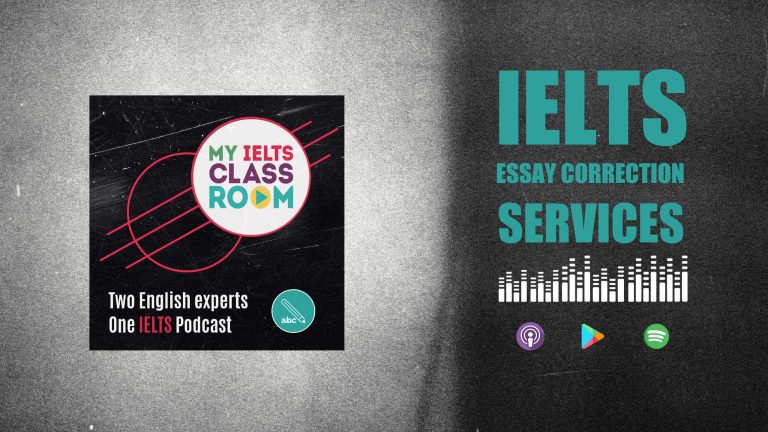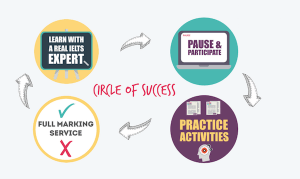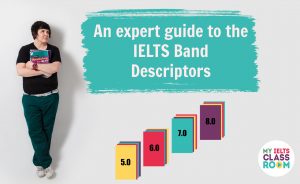
Are you ready for an IELTS Essay Correction Service?
One common aspect of many students’ preparation for writing is signing up for an IELTS essay correction service. However, is this always necessary? At what stage of your preparation should you consider signing up for one? And what makes a marking service good or bad? Guess what – that’s what we’ll be discussing today!
This is a Patron Only Episode: Click here to support the show and gain access to the audio or continue reading about IELTS correction services in the blog post below

https://www.patreon.com/myieltsclassroom
Below, you can find a summary of the episode, which includes all of the links to useful materials and the times of each part of the discussion (so you can go directly to the part you want to listen to) 🚀
Subscribe to My IELTS Classroom podcast on Apple podcasts here
Subscribe to My IELTS Classroom on Google podcasts here
My IELTS Classroom Podcast Summary: IELTS Essay Correction Service
00:00 – 02:28 Introduction – we hit 5,000 downloads
Wow, let’s just pause a minute to reflect on how amazing this is! Just 3 months ago nobody had ever heard of the My IELTS Classroom podcast, but now it has been downloaded 5,000 times by students all around the world (well, maybe 4,987 times – the rest was my family!). I just want to say a massive THANK YOU to you for listening to us each week. It means a lot to Nick and I, and really encourages us to continue bringing your high quality content each week.
00:00 – 09:54 Are you ready for an IELTS essay correction service?
The answer to this question is ‘Maybe’. The key thing to consider is where you are in your IELTS journey. Marking should be the FINAL stage in your preparation for writing. Why?
Because marking is not a teaching tool.
Academic writing requires you to master many skills that take time to build. Let’s consider, for example, what you need to know to write a good essay. I think at the very least, you will need to be able to:
- logically organise the paragraphs in your essay
- construct good introductions / conclusions
- have a clear position throughout your paragraphs
- write clear topic sentences
- build paragraphs so that they progress
- use referencing
- use transition signals effectively
- hedge to avoid over-generalisations
- use a range of complex sentences
- show some topic-specific lexis throughout your essay
Again, this is just the BASIC list of ingredients that any good essay will need. My video course contains many more skills, but if you are currently not sure how to do any of the items on this list, then you are definitely not ready for marking. As I said, paying for an IELTS essay correction service should be the final step in your preparation because marking should just be checking your knowledge i.e. are you able to put all of the academic skills that you have previously studied together to write an effective essay? So, before you even consider an IELTS essay correction service, you should invest your time and money into TEACHING. Let me give you a simple metaphor.

When a student sends me an essay to mark, it’s a bit like they are sending a piece of cake to judge. I’m going to taste that cake, and tell them if it tastes good or if it is too sweet or too dry or if there is too much butter. The point, though, is that I have to work backwards – you have already made the cake, so all I can do is tell you what is “wrong” with it and how you have to change your recipe to make it better next time.
But when I teach you first, I can give you the recipe for the perfect cake first. In other words, I can show you how to organise your paragraphs best, how to give opinions, how to build paragraphs and all the other ingredients of a perfect essay BEFORE you write. Then all you have to do is follow the recipe to achieve a high score. Plus, when I judge your final cake / essay and say – “oh, you added too much flour at the end” you will 100% understand why that is a problem because you know the recipe.
I really hope that you can see the significance of this metaphor and are not just hungry now! The truth is just that marking is so much more effective when it happens AFTER learning. In fact, I think that this is the circle of success:

- 1. You should learn academic writing skills from a qualified expert (not necessarily those at My IELTS Classroom – even though I think we are the best, this formula is the same for every school!)
- 2. Make sure that your preparation is ACTIVE. You cannot learn by just watching. You have to actively participate in a lesson to be able to USE any skills that you learn in the future.
- 3. Practice each writing skill individually. Don’t try to start by writing a whole essay – that would be a totally unrealistic target! Instead, start by learning how to write an introduction, then topic sentences, then how to build a paragraph, and then how to give an opinion, etc. If you can break down the process of writing an essay into small pieces and practice each one individually, you will find that writing a whole essay becomes a lot easier.
- 4. Finally, get feedback. Once you are able to write an essay from start to finish, you are ready for feedback. Now that you know the basic principles of academic writing, you will be able to fully use the comments from a writing expert to improve your writing further and address any personal issues that you may have.
Want to know how the examiner will apply the band descriptors when marking your IELTS essay?
Then download a copy of our FREE e-book, which explains how each of the four marking criteria is applied and includes the most common errors made by test-takers. Just click here for your copy.

09:55 – 14:15 How much marking do you need?
This is a great question and, again, I think the answer is “It depends”. A better question to ask would be “What do I want to achieve from this marking?” I think that there are three possible answers to this question:
- I want to know where I currently stand / I want to know why I got a 6.5 in my previous test. For these students, ONE piece of marking would be enough. Seriously, if all you want to know is your performance for each of the band descriptors, then a good teacher should be able to do this in just one piece of marking. In my course, we call this a First Analysis and I recommend this to any student who has been studying independently and wants to know close they are to their target score, or to any student who keeps getting a lower score than they need so that we can diagnose why.
- I want to pair marking with a writing course to maximise my chance of a high score. I think that this is the smartest way to prepare for IELTS. If you can combine marking with learning, then you are on the path to success. I would say that for these students, somewhere between 3 and 5 essays would be the perfect amount of essay to assess. If your budget is 3 essays, then I would recommend one opinion essay, one problem / solution essay, and one advantages / disadvantages. If it is for 5 essays, then you can do ALL of the main types of essay (Discuss Both Sides, To What Extent, Best Way, problem / solution essay, and advantages / disadvantages). I would also recommend that you consider signing up for three pieces of marking for Task 1 as well. If you are a GT student, then this would be an informal, semi-formal, and formal letter. If you are an academic student, then this would be a compare chart, a change chart and a map or process. So many students overlook Task 1 when they sign up for a marking service, but I have seen countless students miss out on their desired marks because of problems here.
- I want a very high score (7.5+) Great – I love working with students like you! However, again, I would say let’s start with 5 essays (i.e. one of each type) and THEN decide if you need more. My motto is always that less is more, and I want to get you to your target score in as few pieces of marking as possible. By the end of the 5 essays (and hopefully 3 letters or reports), we should have a good idea of your strengths and weaknesses and what you need to focus on to move higher. I often think that moving to completing whole exams (i.e. Task 1 and Task 2) in exam conditions is the best idea at this stage to make sure you are 100% ready for your next test.
14:55 – 18:49 Is it a good idea to write an essay a day?
No! I cannot say this strongly enough. There is no benefit at all to writing an essay a day. The key to improving in any skill is learning what your weak areas are and spending time improving them. If you are writing an essay a day, then there is no way that you are doing enough hard work on your weak areas. I would say that the most you should ever submit to an IELTS essay correction service is one essay a week – and that would be if you were working VERY HARD on your writing skills.
Again, the whole point of marking is that you use the information that your teacher gives you to improve your next piece of writing. If you are just churning out essay after essay, I guarantee that you will just be making the same errors again and again. The students who I see succeed are those who never make the same mistake twice i.e. they take the information they receive in the feedback and they actively address the problem areas.
No good teacher would ever agree to mark an essay a day (and if they do, what they are really agreeing to is taking your money every day!)
14:55 – 18:49 What makes a good IELTS essay correction service?
Let me just say that not every IELTS essay correction service is the same. While marking for one teacher is explaining every error and giving accurate scores, for another it is simply adding two or three ticks to a page and copying and pasting comments. Therefore, before you pay anybody to mark your work, it is vital that you ask to see a sample of their corrections so that you can evaluate if they are a good service or not.
Signs of a BAD service IELTS Essay Correction Service
- There are no language corrections or explanations for the errors: A good teacher will not just be able to correct the errors in your writing, but they should also be able to clearly explain WHY they are errors. Although marking is not the best way to teach students academic writing skills, it is a great place to explain and correct small personal grammar errors. If all your teacher is doing is changing your writing without explaining why, then you will just keep on making the same errors again and again.s
- Comments are all copy and paste: Marking is very time-consuming, and this means that many teachers try to cut corners by having a bank of comments that they copy and paste into every essay to save time (these are usually the teachers who advertise the number of pages in their corrections). While one or two generic comments might be useful, what you really want is a teacher who makes every comment specific to you and your problems. Look at the comments in your essay correction again – are they really focussed 100% on the essay that you write, or could they be added to ANY essay?
- The comments are only negative: Yes, it is great to find out where you went wrong in an essay (after all, how will you improve next time if you don’t know what your errors are?), but good teachers know that students also need to know what they did RIGHT. Pointing out the positives in writing is not just motivating for a student, it is necessary. Understanding what you did well positively reinforces these skills, so that you can repeat them next time.
- Half of the marking is a “model essay”: I am going to be honest with you – I hate model essays. I don’t think that they serve any purpose at all in preparation for the exam. Just because I can write a Band 9.0 essays doesn’t mean that you can. I mean, I am a native speaker with a degree in Applied Linguistics! Of course, I have the grammar and lexis to score highly, but I doubt that 1% of IELTS students have the same language tools as I do. And there is almost no chance that you and I will have the same ideas and arguments for an essay either. So, why do teacher’s offer model essays? Because they are quick to write and you can copy and paste them hundreds of times (and so the “length” of the marking is now 7 or 8 pages!) So, what do I do if I hate model essays? I rewrite my students work in their worn words, so they can see the small changes that they needed to make to move to a 7.0 or higher.
- The comments tell you that you “have to” do something to achieve a high score: There is no ONE correct way to organise an IELTS essay. There are no words that are banned by examiners or that automatically give you a low score. In the same way, there are no grammar structures that automatically give you a high score. When a student emails me to say “My teacher says I must have three paragraphs”, or “My teacher says that you can’t start my essay with ‘nowadays‘”, or “My teacher says that you have to use the passive to get a high score for grammar”, all I hear is huge alarm hells ringing in my head. Why? Because there are hundreds of ways to write an IELTS essay to get a high score. In my experience, only weak teachers who want you to pay for their “special method” tell students that there is only “one way”. My advice would be to avoid them.
- There are no references to the band descriptors in the scoring or the markers gives half bands: At the end of the day, what you have to do to get a high score in IELTS writing is 100% transparent because everything is clearly described in the band descriptors. Therefore, if you are going to pay for an IELTS Essay Correction Service, you want to be 100% sure that your teacher knows what they are and how to apply them properly. In fact, all of the comments and scores that your marker gives you should be based on the band descriptors. One easy way to know if your teacher really understands the band descriptors or not is to see if they give you a score of 0.5 for one of the components. For example, if they say that your score for Grammar is 6.5, then you should know that this is NOT a good IELTS essay correction service because there is no band of 6.5 for grammar. You can ONLY be a 6.0 OR a 7.0 for Task Response, Coherence and Cohesion, Lexical Resource and Grammatical Range and Accuracy, but never a 6.5. If your overall band score is 6.5, this is because you got two or three 6.0’s and one or two 7.0’s. You can read more about how examiners mark your work here.
-
Don’t know what the band descriptors are? Then to Nick and I discuss the most common errors that student make in writing here:
If you enjoyed this short lesson, you can find all of our video lessons on our main website www.myieltsclassroom.com, which is where you can also sign up for our IELTS essay correction service or book a 1-2-1 speaking lesson with Nick or Shelly. 🚀

